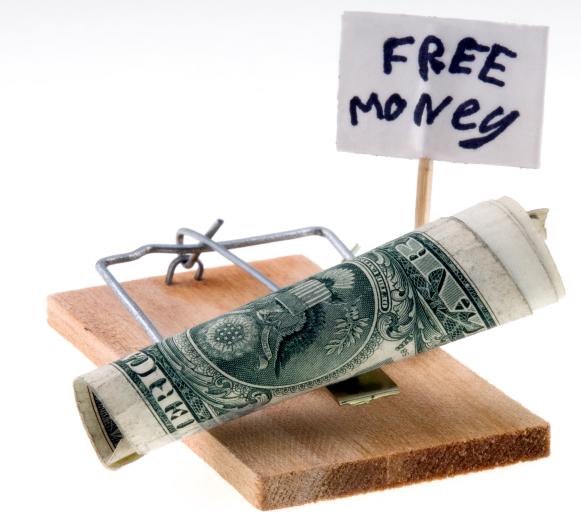If you go to Google and type in anything along the lines of: "Make money online", or "make fast cash", you're likely to come up with thousands of pages of scams trying to take your hard earned money, steal your identity, or just make you frustrated by wasting your valuable time. Today I want to talk to you about avoiding scams. Maybe we can get one up on those people who think it's OK to steal other people's money as a means of income.
First let's talk about what to look for in a scam:
1) Most people who want you to pay for their 'secret way to make money online' are scammers. They will take your money and run, or take your money and then give you the same tips you can get for free online from sites like Hot Shot Blogger, or other similar sites.
It's best to avoid people who want to take your money for their e-book, or video series, or for any other strategy they claim will make you money. Remember, in the real world you don't have to pay money to get a job.
2) Take a critical look at the websites you're viewing.
- Are they asking for money?
- Is the page all white with no pages other than the one you're on?
- Do the testimonials and information go on and on all the way down the page about how great their program is for making money?
- Does it look fake?
- Are there pop-ups that ask you repeatedly 'Are you sure you want to back out,' or something similar?
- Does it seem 'too good to be true?'
These are all things you need to be thinking about. Most legitimate websites are in depth websites, not just one page full of rambling with no real information. If you have to pay to get the information, or give them your credit card or other personal info, then back out immediately and be thankful you weren't tricked.
3) Know who runs the company. Is this company that is promising you money run by another reputable company, or by someone unknown? Take Prizes.org for example. I came across it a few days ago, and wondered if they were legit. Then I saw and verified that they are run by Google, a company I do trust. After looking at how money is awarded and who runs it, I decided that I did trust this website. You can look on Alexa for some of this information as well as reviews. Something you might not know is that you can install the Alexa toolbar on your browser and from there it's very easy to get info about a website you're viewing, and also to leave reviews to help others realize if it is a fraudulent or legitimate website.
1) Check online. If you're really not sure if something is for real or not, you can go to Google and type in: Is _________ a scam? Or simply the website name and then scam. For instance: you could type in zazzle.com scam? Or is zazzle a scam? If zazzle is a legitimate website (which it is) then you are not likely to find anything online about them being a scam. Most people will report scams to the big scam websites online and google will help you find those entries into the scam databases. Occasionally you will come up with complaints against a website with the BBB (Better Business Bureau) about a website or company, but you can look at the comments and take them for what they are, deciding if there is anything legitimate to the complaints. The BBB allows companies to rectify any wrongdoings with the complainers, and lets consumers know if this has taken place.
2) Brows the internet with your anti-virus software turned on. There's been a number of times when Avast! Anti-virus has popped up on my screen telling me I've just entered a website with viruses on it. I can then back out with no issues to my computer and nobody installing a trojan or something else that will try to steal my credit card info the next time I use it to buy something online. If you don't have a good anti-virus software, I recommend Avast which you can find on CNET. It's free, and trustworthy.
This method is not so much about detecting scams as it is about keeping you safe. A lot of websites with viruses out there aren't even fraudulent, but have sold advertising to fraudulent people who are trying to steal your personal information.
What have been some of your experiences with online scams? What are some ways you avoid getting scammed? Let us know in a comment below, and don't forget to follow for more great tips and info about building your blog!








0 comments:
Post a Comment